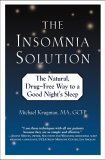Sleep Duration
Human sleep requirements vary widely. They vary from person to person and also change with age. Whilst infants need about 16 hours sleep a day, adults can manage with 7 to 8 hours sleep. Many older people only sleep 5 to 6 hours a day. It is particularly older people, whose need to sleep decreases, who interpret this as insomnia.
When is it a sleeping disorder?
Only if everyday life is affected by a lack of sleep is it referred to as insomnia. Symptoms include daytime weariness and a tendency to fall asleep during the day.
What types of sleeping disorders are there?
- Difficulty falling asleep: One can speak of a sleeping disorder if it takes more than half an hour to fall asleep.
- Difficulty staying asleep: It is considered a disorder if one is not able to sleep through the night and if one needs more than half an hour to fall asleep again.
- The sleep-wake-cycle can be disrupted if one does not fall asleep at a normal time (jetlag).
- One can speak of serious daytime weariness when one falls asleep unwillingly during the day.
- Other distinctive symptoms include sleep walking, sleep talking and teeth grinding.
Causes of Insomnia
Psychological Reasons for Insomnia
Insomnia is usually triggered by psychological factors such as stress, worries, psychological strain or depression.
Physical Reasons for Insomnia
Physical causes of insomnia can include sleep apnoea (breathing pauses during sleep), restless legs (restless legs syndrome), pain, noise or bright light.
Physiological Reasons for Insomnia
Example: Shift work
Pharmacological Reasons for Insomnia
Example: alcohol, coffee consumption, side effects of medication.
top 

Say Good Night to Insomnia
Gregg D. Jacobs
|
What can be done to fight insomnia?
The following measures can be used to fight insomnia (sleep hygiene):
- Doing exercise regularly a few hours before going to bed helps. However try to avoid a lot of physical movement right before going to bed.
- The bedroom should always be well aerated and only slightly heated, if at all. Aerate the bedroom before going to bed.
- Avoid eating foods in the evening that are difficult to digest.
- Stimulating beverages such as coke and coffee should be avoided as should alcohol and nicotine. Alcohol may help you to sleep but it also causes fragmented sleep.
- Before going to bed you should do relaxing activities such as reading or going for walks.
- Avoid light and noises at night.
- Only go to bed when you are tired.
- Relax yourself before going to sleep.
- Wake up every morning at the same time. This helps you to get tired quickly and sleepy at the right time in the evening. Going to bed at the same time is also important for developing a healthy sleep-wake cycle.
- Relaxing methods such as autogenic training, yoga or progressive muscle relaxation also help.
Do sleeping pills help to fight insomnia?
The body gets used to the intake of sleeping pills very quickly. As a result, the body needs higher dosages over time to facilitate falling asleep. The effect of sleeping pills can still continue the next morning. Try as best as possible to sleep without taking sleeping pills.
Should you go to the doctor if you have insomnia?
If the insomnia is intense and lasts for a long time you should consult a doctor. Diagnosing insomnia can be done by a sleep laboratory which could mean spending one or several nights in the clinic where important values are recorded and determined for the diagnosis.
top 

The Insomnia Solution : The Natural, Drug-Free Way to a Good Night's Sleep
|

